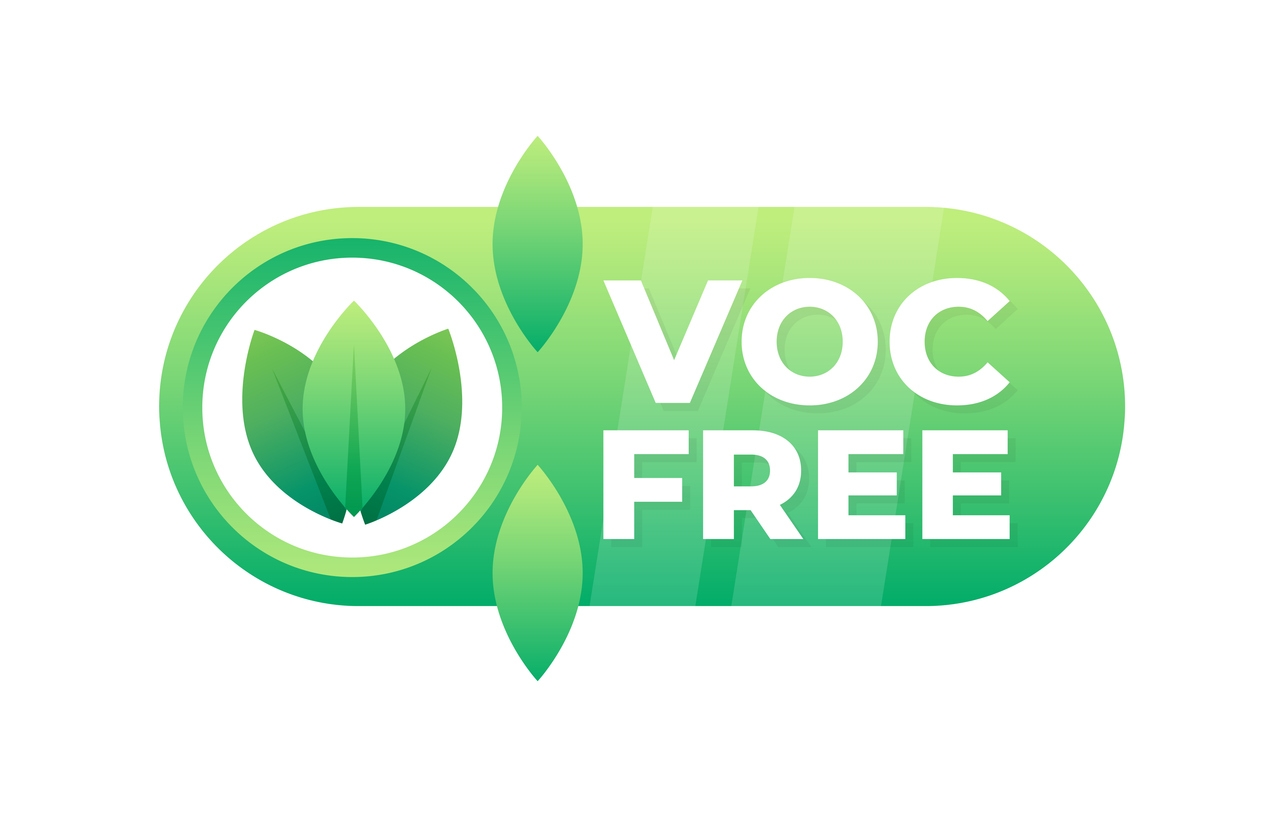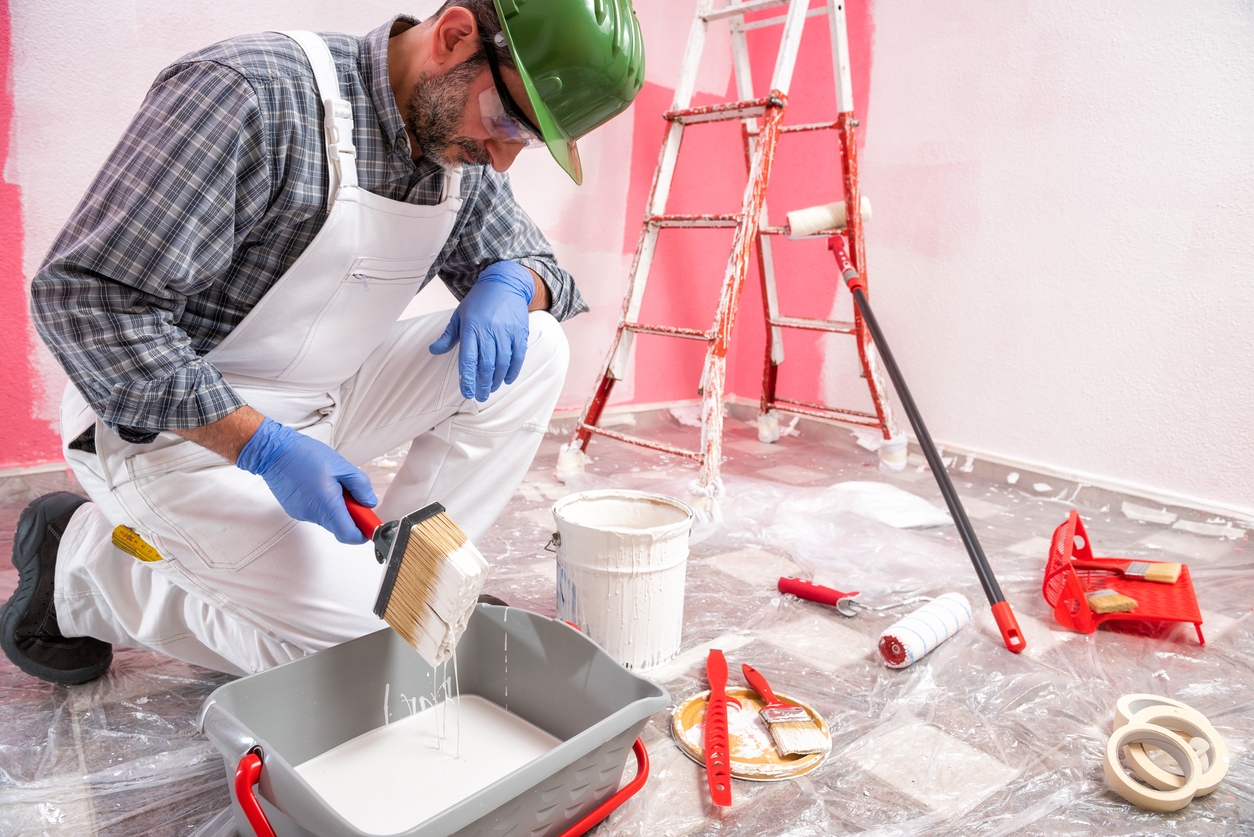When hiring a professional team for your house painting project, there are specifications you and your painters must discuss.
The usual pre-painting specifications include the size and scope of work, timeframe, and schedule, preparation requirements, paints and other necessary coatings, tools and materials, paint finishes, post-painting, and final cleanup, not to mention budget.
Some clients make additional requests to their painters, including whether to include door and trim for painting or paint accent walls. Others specify that the paints should have low or zero levels of volatile organic compounds (VOCs).
What are VOCs and their role in paints?
VOCs, or volatile organic compounds, are chemicals that easily evaporate into the air at room temperature. In paints, VOCs are used as solvents that help the paint’s components blend and spread more easily. However, they play a significant role in indoor and outdoor air pollution and can impact the health of living organisms.
Here’s how VOCs affect paints:
Function in paints
- Drying process: VOCs help the paint dry faster by evaporating as the paint cures.
- Consistency: They contribute to the paint’s viscosity and workability, making it faster and more convenient to apply.
Health and environmental impacts
- Health risks: Prolonged exposure to VOCs can lead to respiratory problems, headaches, dizziness, and even more severe health issues, especially in poorly ventilated areas.
- Air quality: Once VOCs evaporate, they can contribute to the formation of ground-level ozone and smog, affecting indoor and outdoor air quality.
Low-VOC and zero-VOC paints
- Due to the harmful effects of traditional high-VOC paints, many manufacturers have started producing low-VOC or zero-VOC paints. These options reduce or eliminate VOC emissions, making them healthier and more environmentally friendly while providing good coverage and finish.
More homeowners are becoming aware of the importance of quality air, especially indoors. They want to include low-emission paints in the job estimate, even if they are generally costlier than paints with VOCs. These low—and zero-VOC paints can help improve indoor air quality and protect the health of the home’s occupants.
Ask your painter to include low- or zero-VOC paints in your project
If your local residential painters haven’t used low- or zero-VOC paints before, you can request them to include these paints in the overall job cost. It’s a usual and environmentally friendly option that many DIY and professional painters are familiar with. Here are a few tips on how to approach the request:
- Mention it during the initial consultation: Let the painter know you’re interested in low- or zero-VOC paints, and ask if they are comfortable working with those products.
- Ask for specific brands: You can inquire if the painter has experience with specific low- or zero-VOC brands (e.g., Benjamin Moore’s Natura or Sherwin-Williams’ Harmony) or suggest one.
- Cost considerations: Some low-VOC paints may be more expensive than traditional paints. Ask the painter to break down the cost difference in the estimate so you can see how it impacts the overall budget.
- Confirm quality: Ensure the painter is confident in the quality and finish of low-VOC paints for your project. Some paints may require more coats or have specific application requirements.
- Health and environmental benefits: Highlight that you want a safer, healthier indoor environment and reduced environmental impact, which may also align with the painter’s professional values.
Choosing low- or zero-VOC paints has become an increasingly popular request.
The benefits of using low- and zero-VOC paints
There are many benefits to using these paints for the homeowner and painter:
- Children, the elderly, pregnant women, and immunocompromised individuals will benefit from low- and (especially) non-VOC paints, as they reduce toxins.
- Speaking of reduced toxins, low—and zero-VOC paints are good for the environment. When cleaned up, washed away, or thrown into the garbage bin, these toxins will not make their way to landfills or groundwater.
- Low- and non-VOC paints are equally good as their VOC counterparts in terms of quality and performance. They are easy to clean and scrub, hold up well, and can cover flaws in previous paints with VOCs.
- All low- and non-VOC paints are water-based, making them easy to clean with soap and water.
- Low- and non-VOC paints emit no hazardous fumes or off-gassing, making them safe for human health and the environment.
- Since the EPA declares that non-VOC paints are non-hazardous, they are generally safe for disposal.
Natural paints – the safest option for interior house painting
If you want the safest interior house painting possible, ask your painters to use natural paints. These paints are made from renewable, non-toxic materials such as plant oils, natural resins, clay, chalk, and minerals rather than synthetic chemicals found in conventional paints. They offer an eco-friendly and healthier alternative to home painting.
Here’s everything you need to know about natural paints:
Composition
- Plant oils: Linseed oil, soy oil
- Minerals: Clay, chalk, lime, marble dust
- Natural pigments: Iron oxide, earth pigments, ultramarine
- Binders: Natural latex, casein (milk protein), or natural resins
- Solvents: Citrus oils, essential oils, or water (for water-based types)
Types of natural paints
- Lime paint: Made from limestone, it allows walls to “breathe” and is naturally mold-resistant.
- Clay paint: Made from clay and pigments, it’s known for its matte finish and good breathability.
- Casein paint: Made from milk protein, it provides a durable and traditional finish.
- Natural oil paints: Use plant oils as a base and can be suitable for wood and metal surfaces.
Advantages
- Low VOCs: Volatile Organic Compounds (VOCs) are much lower than synthetic paints, resulting in better indoor air quality.
- Non-toxic: No harmful chemicals or heavy metals, making them safer for people with allergies or chemical sensitivities.
- Eco-friendly: Made from biodegradable and renewable resources, they reduce environmental impact.
- Breathability: Natural paints often allow surfaces to breathe, reducing moisture issues and mildew growth.
Limitations
- Durability: Natural paints may not be as long-lasting as synthetic options, requiring more frequent touch-ups.
- Cost: They can be more expensive than conventional paints.
- Limited color range: Natural pigments provide a more limited selection compared to synthetic colors.
Safety
Natural paints are considered safer due to their non-toxic nature, especially in spaces like children’s rooms, bedrooms, or places where people with sensitivities spend time. They reduce the risk of harmful chemicals off-gassing after application.
Natural paints are an excellent choice if you’re looking for a safer, environmentally friendly option for house painting. However, for high-traffic areas where durability is crucial, you might want to weigh the pros and cons or explore hybrid options.
Our team from Custom Painting, Inc. is open to using different paint options. Furthermore, we support healthy, environmentally friendly, and sustainable paint options and practices. If you work with our team, you can ask us directly about our experience and approach to these options and practices. And yes, you can absolutely request us to include low- and zero-VOC paints in your house painting job estimate. Call us at 925-686-0903 or message us here!



